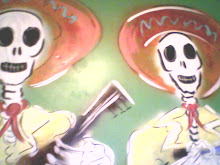SHAUN OF THE DEAD (Wright, 2004)
SHAUN OF THE DEAD is an interesting take on one of the classic monster themes: change. And more exactly, the fear that always comes with it. Vampires, zombies, werewolves; these archetypes all address our natural aversion to evolution, to shaking up our daily routines. Oftentimes, these fears are examined through the alteration of a loved one. When you're bitten by a werewolf, you've got to deal with it. But how does one cope with the change of a loved one? NIGHT OF THE LIVING DEAD is great with this type of stuff; all of Romero's stuff is, really. It's one of the themes he dealt with best. For as much as people talk about Romero's social commentary, he was also really good at interpersonal relationships, and the ways that changing into one of the undead lead to a shift in one's lifestyle.
SHAUN takes this theme to its logical end, and speaks to what it is we're all really afraid of: losing those we love and never having told them how we feel. Shaun is a slacker (good-natured and harmless, to be sure, but a slacker just the same) whose general contentment to coast through life starts to cause problems in his relationship with Liz. They've been dating for three years, but she's never met his mom, they don't spend enough time together, and she's upset that he's still stuck in the same dead end job he was for however many years he's been stuck at the same dead end job. Shaun, of course, has become accustomed to these day-to-day happenings. Comfort is the word, and the trouble. Our boy Shaun wants to change, he really does, and he wants to take Liz out to a nice restaurant, but in the end, the pub at the corner is what he knows, what he's used to, and where he would rather spend his time. SHAUN OF THE DEAD is very much a picture about longing to live and not being sure how to do it. This is portrayed quite literally by the zombies who have been rising up from the grave, but also by Shaun, staring dumbfounded into the camera at the film's opening. There's life in there, somewhere. He just isn't quite sure what to do with it.
The answer is provided when his life, and the lives of everyone he holds dear, are put into danger. It is a comment on humanity that it takes disaster to shake us up and make us realize that most days, we stumble through life half-awake and don't truly appreciate everything that is afforded us. He blows things with Liz because he forgets to make a dinner reservation at that upscale Italian joint, Fulci's (get it?), but only realizes his mistake when it's too late. This is indicative of his attitude towards the larger world around him. Shaun sees the chance to change his life by becoming a hero, not at all unlike Ash in THE EVIL DEAD, an average appliance salesman turned zombie-slaying machine. The zombie apocalypse provdes advantageous to Shaun, who can finally attach some type of meaning to his life. And with this mindset, he does do some rather mature things. He stands up to, and subsequently grows closer to, his stepfather. He shoots his re-animated mother. His best friend sacrifices his life for him. And then he and Liz prepare to take their own lives when things get too bleak. SHAUN's British humor always retains a blackened tint that is missing from most American comedies, but the film's final moments do seem as if they're going to be excessively dark.
And then the military rushes in and saves the day. Bit of a copout, but what can you do...
In the aftermath of their rescue, Shaun and Liz return to how their lives largely were before the zombie outbreak, but they do seem happier now. Therein lies the joke, which is also played out by the constant bickering among our band of zombie hunters. Life's small things don't stop in the face of tragedy. Relationship problems still exist when the zombies attack, and pretending they don't doesn't make them go away. The final gag is that in spite of how much both Liz and Shaun have changed, at the end, they're right back where they started. Disasters alter nothing, and when they're over with, we don't learn some greater truth about ourselves and humanity. We go right back to playing video games. I don't think it's being unrealistic to say that Liz is compromising, but perhaps the point is that sometimes, compromise is OK, too. After all, change is scary, right?
Labels: 31


0 Comments:
Post a Comment
<< Home